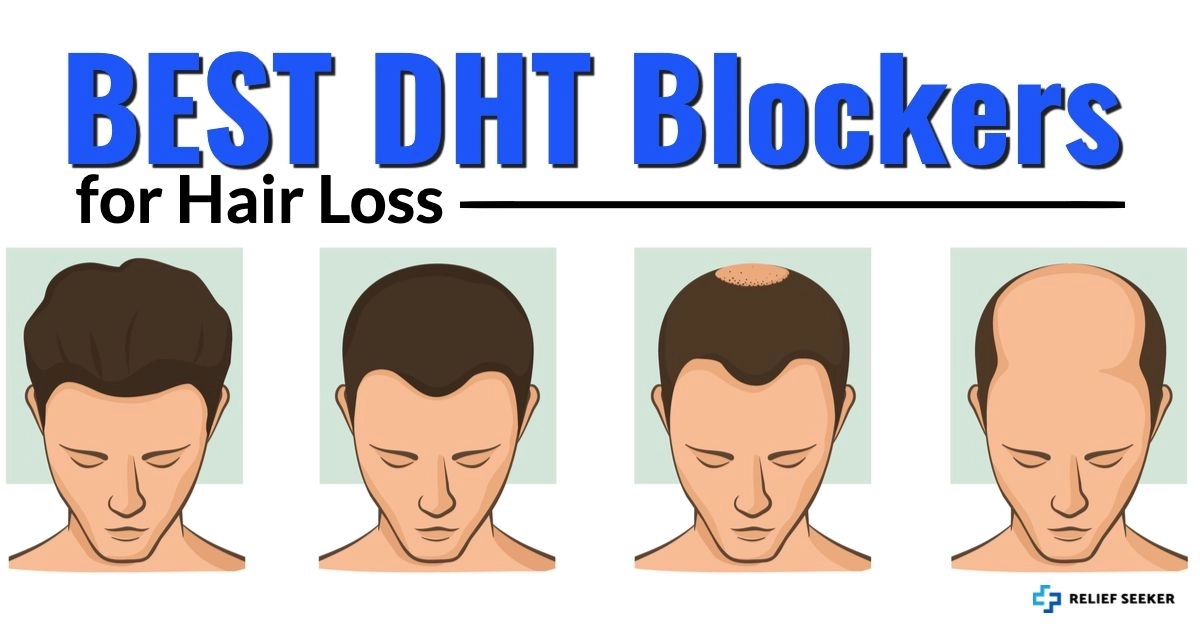DHT blockers are used to treat alopecia (also known as male pattern baldness). They are available as the prescription drug finasteride (brand name Propecia) as well as in natural forms (such as pumpkin oil and caffeine).
With so many DHT blockers available, it’s difficult to know which ones are worth trying. Since most DHT blockers take several months to start working, you may want to take the most effective one to stop or slow hair loss.
Discover the best DHT blockers, where to find them, and how to take them for simple & easy hair loss treatment.
What Is DHT?
Dihydrotestosterone (DHT) is a sex hormone that is created from testosterone. It’s responsible for deepening the voice, growth of genitals, and growing body hair.
Yet like most hormones, DHT isn’t perfect.
This hormone can also cause male pattern hair loss (also known as alopecia), thinning hair, and receding hairlines. While DHT-related hair loss is most common in men, women can experience this type of hair loss, too (as women’s bodies also create testosterone).
DHT also regulates muscle storage, fertility, and sexual health to some degree. Too much DHT can also lead to an enlarged prostate or other prostate-related health conditions.
What Are DHT Blockers?
DHT blockers are exactly what their name suggests: they block the DHT hormone from binding to the 5-AR receptors in your hair follicles. These blockers can be found in nature, but they’re most commonly manufactured in a lab and sold as prescription medication.
While DHT blockers don’t regrow or promote hair growth, they can slow down or stop hair loss.
The most widely recognized DHT blocker is Propecia, which was developed by Merck in the 1970s to treat an enlarged prostate (which can also be caused by too much DHT) and marketed as Proscar in a 5 mg dosage. Merck rebranded the medication in the 1990s at a lower dosage (1 mg) and sold it to treat hair loss.
Within the past decade, Merck’s patent ran out, and drug manufacturers were able to sell it under its generic name, finasteride — with a much lower price tag.
Are DHT Blockers Effective?
The prescription DHT blocker finasteride is an effective treatment for hair loss for most men. In fact, this FDA-approved drug slows and stops hair loss for about 85% of men that use it.
Finasteride should be taken for three-to-four months to see optimal results. The effects of finasteride are most dramatic when the drug is used in conjunction with other DHT blockers. Some men even combine finasteride with minoxidil (otherwise known as the brand-name drug Rogaine).
Doctors even recommend that patients use natural hair loss remedies (such as a scalp massage to increase scalp circulation or light therapy) in conjunction with finasteride.
Other natural DHT blockers may include vitamin D, pumpkin oil, green tea, and caffeine. Before starting any natural remedy treatment, you should always talk to your doctor to ensure the correct dosage and check for possible medication interactions. Check out Hims vs. Keeps vs. Roman - where you can consult a doctor about this treatment online.
Natural DHT Blockers Vs Prescription Medication
Other DHT blockers, such as natural remedies and light therapy, are known to be effective ways of combating hair loss.
Yet, the results of these treatments are often more subtle, and natural treatments generally work best when used in conjunction with prescription DHT blockers.
The biggest downside to using natural DHT blockers is that you don’t have a medical professional advising you on the proper use and dosage information. Many natural DHT blockers also come with their own side effects that can lead to other serious conditions or uncomfortable symptoms.
If you’re planning on using a natural DHT blocker, just make sure to talk to your doctor first.
DHT Blocker Side Effects
As with nearly all prescription medications, there are a few side effects you may need to know about before starting DHT blockers.
Some of the most common side effects of finasteride include:
Decreased sexual desire/sex drive
Difficulty reaching orgasm
Ejaculate issues
Fatigue
Hives
Impotence
Increased risk of infertility
Sexual function
Skin rash
Swelling in hands or feet
If you already suffer from any of the above side effects, you should tell your doctor before starting finasteride. The side effects of natural DHT blockers differ from the above side effects, and you should check with your doctor about possible symptoms before taking natural remedies.
How Common Are DHT Blocker Side Effects?
The good news is that DHT blocker side effects (specifically the side effects of finasteride) are extremely uncommon. About 2% of men that take finasteride end up experiencing such side effects, and many doctors can’t be certain that the finasteride even caused the symptoms in the first place.
The side effects of this drug are similar to symptoms of other common conditions. If you’re worried about suffering from side effects, you may want to make a few lifestyle changes to reduce the chances of experiencing these symptoms.
In clinical studies, the number of participants that experienced side effects while taking finasteride was similar to the number of participants that experienced side effects in the placebo group — meaning that the symptoms may or may not have been caused by finasteride.
Do DHT Blockers Cause Cancer?
DHT blockers are also often linked to two types of cancer: male breast cancer and prostate cancer.
The connection between cancer and finasteride is a little unclear, and there isn’t a lot of data on the subject. There’s simply not enough clinical research to definitively state whether or not finasteride causes cancer.
Yet, one study suggests that finasteride might actually help prevent prostate cancer (which makes sense, given that the drug was initially developed to treat enlarged prostates).
When it comes to the connection between breast and prostate cancers and finasteride, we simply need more research and data.
If you’re concerned about cancer, talk to your doctor before starting finasteride.
How Long Do DHT Blocker Side Effects Last?
Most men report that finasteride side effects only last for a few days to a few weeks. Yet, others report their symptoms lasting longer.
Men that stop taking finasteride generally see symptoms dissipate within a few days to a few weeks after they stop taking the drug. Some men report that their symptoms never go away, but (again) scientists need to do more research to determine if the symptoms were caused by finasteride or something else.
Again, if you have a history of erectile dysfunction, ejaculatory issues, or infertility or impotence, you may want to talk to your doctor before starting DHT blockers.
Best DHT Blockers
Men and women that want to stop losing their hair have plenty of options when it comes to reducing their DHT levels. There are several types of DHT blockers available, from prescription medications to natural remedies and supplements.
Discover the best DHT blockers, where to buy them, and which ones are worth your money.
DHT Blocker Prescription Medication
One of the best DHT blockers is a prescription medication. These medications come in two forms: oral and topical.
Finasteride is a 5-alpha reductase inhibitor hair loss treatment. It’s one of the most effective DHT blockers on the market. It can slow or stop hair loss, receding hairlines, and hair thinning.
What it can’t do? Regrow hair.
If you’re looking for hair regrowth and maintaining thick, healthy hair, you’ll want to opt for minoxidil (generic Rogaine). This treatment comes in an oral tablet or a topical hair loss shampoo or conditioner.
DHT blocking shampoo can improve hair health and even grow new hair. Some doctors even recommend using prescription DHT blockers in conjunction with natural treatments, such as supplements, light therapy, and essential oils.
Digital clinics like Keeps and Roman staff doctors who can provide a virtual consultation and prescribe generic finasteride, which gets shipped to your home or office. Simply fill out a few forms, chat with a doctor, and get treatment.
Natural DHT Blockers
Natural DHT blockers are hair loss treatments that you don’t need a prescription for. The most common active ingredients of DHT blockers include:
Biotin
Saw palmetto
Green tea extract
Rosemary oil
Natural ingredients
Pumpkin seed oil
These ingredients are known to block DHT — just at a more subtle rate than their prescription counterparts. There are very few clinical studies that prove these ingredients are effective at slowing or stopping hair loss.
They also come with their own side effects (each ingredient has its own side effects, such as burning or pain at the application site, stomach aches, or more hair loss). Check with your doctor before taking natural supplements, and keep an eye out for symptom side effects.
Many doctors recommend taking these active ingredients in conjunction with prescription DHT blockers for the full effect. They’re often found on their own or are included as active ingredients in supplements.
DHT Blocker Supplements
If you don’t want to mess around with buying pumpkin seed oil or other natural ingredients, you can always purchase a supplement that blocks DHT. You don’t need a prescription to purchase these supplements, and they’re often readily available on Amazon.
Most supplements contain natural DHT ingredients listed above (or a combination of several), mixed with enzymes.
The biggest downside to such supplements is they’re often not approved by the FDA for their intended purpose.
Light Therapy
Light therapy is another DHT blocker treatment that’s become more popular in the past few years. Low-level laser therapy (LLLT) devices are approved by the FDA to treat hair loss and are more effective than a placebo in hair regrowth clinical studies.
Your doctor may recommend a combination of prescription medication, natural DHT blockers, and LLLT to ensure the best possible results.


